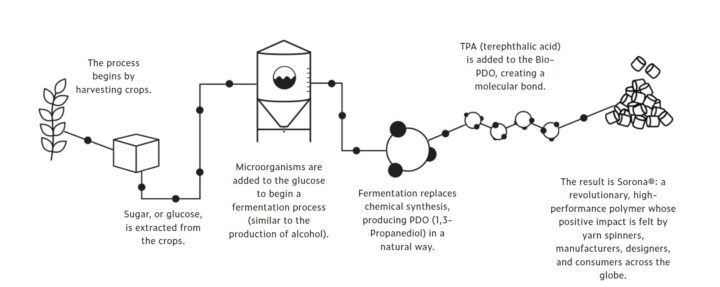
There’s a new synthetic fiber used in shaving brushes that’s entered the wet shaving community; specifically, the Mühle Silvertip Fibre (STF) as of writing this article. Mark (Mantic59), owner of Sharpologist, has graciously invited me to talk about it and its unique features. This new synthetic fiber is not your typical synthetic fiber, since this one is 37% plant-based. This is something we have never seen before in the wet-shaving industry—an eco-efficient fiber that consists of 37% renewable, plant-based raw materials, requiring 30% less energy and emitting 63% fewer greenhouse gases than the production of conventional synthetic fiber1. It’s called Sorona®. In this article, I’ll be discussing how Sorona® is made, how it performs, and what the future looks like with options like Sorona® in the mix.
How it’s made…Corn!
Well, it’s a little more complicated than just processing corn. In fact, Sorona® is made by one of the world’s leading scientific-industrial companies in DuPont. It’s the same company that engineered Kevlar & Spandex. The process starts by harvesting Industrial Dent Corn (this is the 37% plant base, while the rest is polyester). Due to its high starch content, dent corn isn’t used for human consumption, but rather for animal feed and personal care products2.
This next part is a little technically dense, but bear with me, it’s just a few sentences.
From the dent corn, sugar is extracted. Microorganisms are added to the glucose (sugar) to begin a fermentation process (similar to the production of alcohol). Fermentation replaces chemical synthesis, producing PDO (1,3-Propanediol) in a natural way. TPA (terephthalic acid) is added to the Bio-PDO, creating a molecular bond3. The result is Sorona®—a polymer that can be used in a variety of industries, and in our case, it’s been applied to shaving brush fibers.

As someone who comes from a business background rather than a science background, that’s a lot to digest. If you just want to just call it your corn brush when you’re using it, I wouldn’t blame you. Although that might sound a bit corny. Alright I’ll stop.
OK…but what’s performance like?

Okay, so the plant-based fiber is cool and all, but many enthusiasts of wet shaving care about one thing above all: performance. My overall impression after spending some time with it is that it does the job in replicating what it’s trying to replicate in silvertip fiber. The plant-based fiber is thinner than the original STF fiber, which keeps the tips about the same softness if not slightly softer. The most noticeable differences come in the backbone of the knot (and as such the splay), as well as the water retention. The plant-based fiber has less backbone. Less backbone allows for more splay, which isn’t too bad if it’s trying to imitate silvertip, as silvertip is a splay friendly fiber to begin with.
The plant-based fiber also retains significantly more water; as such, it’s slightly thirstier when you’re building a lather and it’s also slower to dry than the original STF fiber. Overall, it certainly has its differences to the original STF fiber. At AP Shave Co., I recognized these differences and worked with Mühle to create a version that is 20% denser, which I’m calling the Dense++ version (a + for every 10% extra density). The Dense++ version exclusively available here helps mitigate some of that lost backbone I’m seeing when going from the original STF fiber to the plant-based fiber. I’m also setting the knot a bit deeper, by 1-2mm, to help add a little more backbone for my customers as-well.
Sweet. But what about the future?

This appears to be the first iteration in what I hope will be an industry wide shift to more renewable fibers. One of the key obstacles to getting there is the tapering of the fiber. Modern synthetic fibers (before the plant-based fiber) allowed manufacturers to taper the fiber which allowed for a stiffer base while still retaining a soft tip. This tapered fiber like that in the G5C allows for an experience that takes the best parts of natural hair, such as a ‘natural backbone’ feeling, and combines it with the best parts of synthetic fiber, like the speed and ease of creating a nice thick lather without the fiber absorbing or ‘eating’ any of it. I don’t see that same tapering in the plant-based fiber yet—the hair is consistently thin and soft throughout. This makes for a super soft face feel even when fully splayed but comes at the expense of backbone.
In the future, I’d like to see a plant-based fiber that’s been tapered to allow for some more backbone, at which point we can say that traditional synthetic fiber may no longer be needed, and we can start focusing our efforts on developing new types of plant-based fibers that either perform better or are even more eco-efficient (or ideally, some combination of both!).
Only time will tell.
For now, I’d like to thank Mühle for bringing this fiber as an innovation to all wet shavers, Mark for allowing me to chat about it on his website, and all of you for taking the time to read my commentary on the topic. Until next time.
-Andrew
About The Author:
Andrew has 8+ years experience sourcing all things shaving brushes. Whether it’s brush fibers from Thailand, materials for handles from the UK / Italy / Germany, or manufacturing facilities in Germany & China, Andrew’s built a wealth of knowledge regarding creating the very best shaving brushes at AP Shave Co. He aims to have shaving brushes for every budget at his shop and hopes his knowledge & expertise translates into making your shaving routine a little better each day.
- https://ca.muhleshaving.com/blogs/shaving-tips-how-to/silvertip-fiber%C2%AE-now-even-more-sustainable ↩︎
- https://appareltalksbyapurva.wordpress.com/2021/02/05/dupont-sorona-plant-based-spandex-alternative/ ↩︎
- https://ca.muhleshaving.com/blogs/shaving-tips-how-to/silvertip-fiber%C2%AE-now-even-more-sustainable ↩︎

Shades of Swatch Groups bioceramic